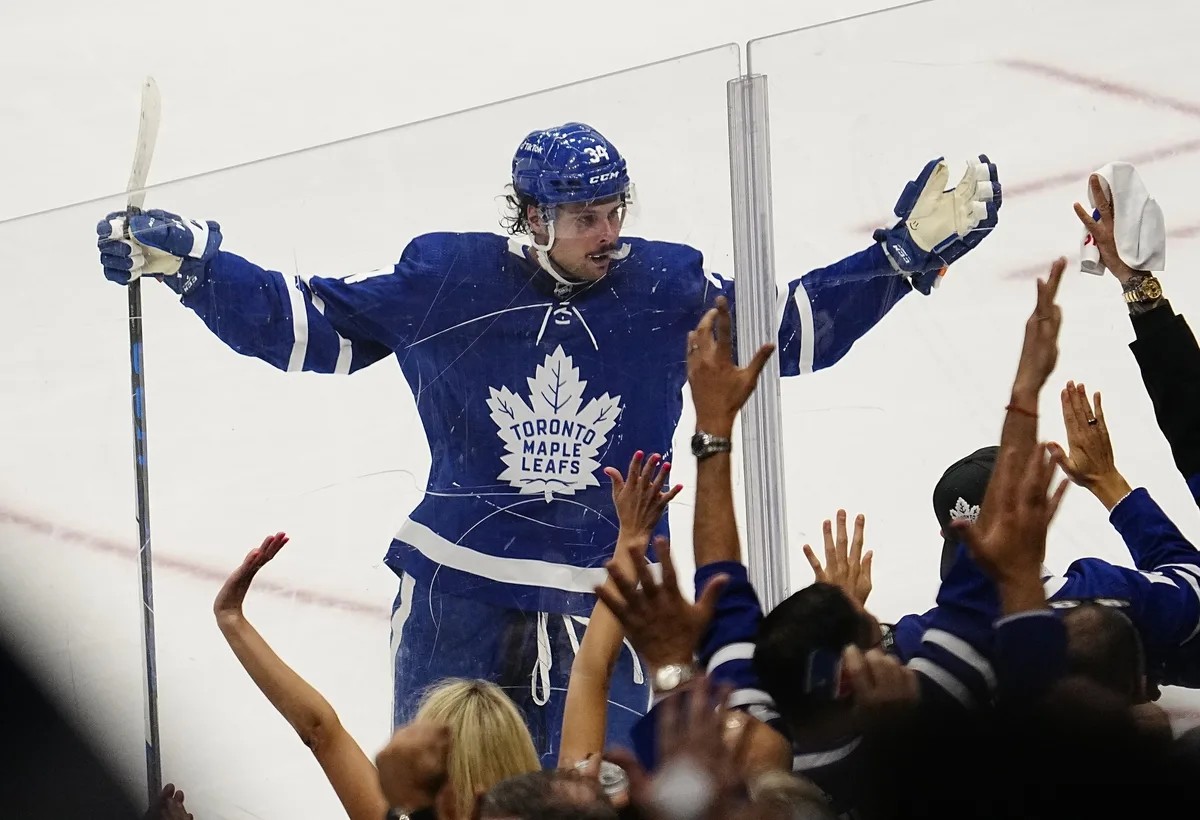One of the Maple Leafs’ most exhausting sagas is over: Auston Matthews has extended with Toronto for four years at an annual cap hit of $13.25 million.
After months of speculation, Matthews teased the deal with the following tweet:
I feel fortunate to continue this journey as a Maple Leaf in front of the best fans in hockey! I will do everything I can to help get us to the top of the mountain. GLG! #LeafsForever
— Auston Matthews (@AM34) August 23, 2023
Which was confirmed by the team moments later with details:
✍️ We’ve signed Auston Matthews to a four-year extension » https://t.co/amNLkXXtKH
— Toronto Maple Leafs (@MapleLeafs) August 23, 2023
The contract – four years at $13.25 M ($53 M total) — will begin after the 2023-24 season and will run through 2027-28. For Matthews, this represents a $1.61 million annual pay raise from his current $11.64 million cap hit, a reasonable number given Matthews’ supreme talents and the fact that the NHL salary cap is set to rise significantly over the life of the contract. His current cap hit represents 13.9% of the current NHL salary cap. Based on CapFriendly/NHL projections, the new cap hit will be 14.4% of the projected 2025-26 salary cap and that clip could fall further if the cap continues to rise in the final two years of the contract. From a cap-hit standpoint, there’s nothing wrong with this deal at all.
However, that doesn’t tell the entirety of the story. For one, Matthews’ new contract makes him the highest-paid player (by cap hit) in the NHL when it begins, which comes with another vaunted distinction all of its own. That label will only last a short time until Leon Draisaitl’s deal is up, followed by Connor McDavid the year after, but for now, it comes with considerable hype and expectations that will place additional pressure on Matthews on the ice, as if more scrutiny was needed.
Secondly, Matthews’ decision to only take four years is a continuation of the contract saga that has in some ways defined this era of Toronto Maple Leafs hockey. Just as his last contract was only five years — instead of the standard eight — this one is four years instead of eight, as Nathan MacKinnon signed last offseason (as well as Jack Hughes). Nearly every other star in hockey willingly signs eight-year contracts when given the opportunity, locking in long-term stability over the chance to chase more money. All three of Toronto’s core forwards — Auston Matthews, William Nylander, and Mitch Marner — have declined opportunities to do so, choosing to maximize their ability to extract future monetary gains.
Players to sign for over $10M AAV with less than a 7-year term:
Auston Matthews x 2
Mitch Marner x 1— Drew Livingstone (@ProducerDrew_) August 23, 2023
Of course, one can argue that it is smart business to do so, and I would agree. Locking yourself into a long-term contract while the salary cap is set to go up doesn’t make a ton of financial sense and for Matthews, signing this contract allows him to sign one more monster contract in 2028 (that one will likely be eight years), when he is 30 years old. Depending on whether the Maple Leafs have won a Stanley Cup or not, he may then have the opportunity to go somewhere else where it is more attainable, should he have not won in Toronto and if the Leafs‘ window appears to be closing at that time. It’s smart business and if I were in his position, I have to say I would do the same.
But just because it is smart, doesn’t mean it’s typical or team-friendly. As stated previously, the vast majority of NHL players go down the (often) financially nonsensical path of locking themselves into these extremely long contracts, unlike the sort of business we see in the NBA, where stars opt for shorter deals that allow them to keep re-upping for progressively larger monetary values and can switch teams to better chase championships. When you choose to be one of the few NHL stars who doesn’t follow the pack, that is going to bring justifiable fan ire. Matthews has shown a priority in signing deals to maximize his earnings relative to other stars and given the dynamics of sports and the relationships between fans and players, that will rub some the wrong way.
The matter of team success is another component. Some fans will take the Nick Kypreos angle and argue that Matthews doesn’t deserve this money because he hasn’t led the Leafs to a Stanley Cup like MacKinnon has for Colorado. Others may flip it around by saying Matthews is correct not to lock up long-term with a franchise that hasn’t gone beyond the second round of the playoffs yet — and only just got past the first. In that way, it can be interpreted as a pretty fair deal: the player probably wanted something in the $14 M or $15M AAV range (as was reported), while the team probably wanted it closer to the MacKinnon $12.6M number. The cap hit is somewhere in between — close to the exact middle.
Matthews also held tremendous leverage over the Maple Leafs. He is a top-five forward in the NHL who won the Hart Trophy one season ago. Even in a “down year” of 2022-23, Matthews scored 40 goals and 85 points in 74 games, then added five goals in six games to break the Leafs’ first-round curse. He certainly has one more gear to find in the playoffs, but he still has nine goals in his last 18 playoff games. 299 goals through age 25 is a staggering number and if Matthews can maintain good health for another decade-plus, he’s as good of a bet to reach 600 — and maybe 700 goals — as we will ever see post-Ovechkin. Toronto fans are now reassured that they’ll be able to watch him soar toward such heights in a Leaf sweater for the next five seasons.
Matthews is a true generational goal scorer — a word that is thrown around far too much but is true in this case — and that’s before adding in his impacts in the defensive zone and elsewhere. He plays the most important forward position and is in the prime of his career, with this contract deciding that he will play that prime out in Toronto. The Maple Leafs will be a Stanley Cup contender so long as Matthews is around and could not, under any circumstances, allow him to leave — hence why AM34 possessed the leverage. For Brad Treliving to get this deal done at this price is a win for the new GM, fan anger over the terms dictated by Matthews notwithstanding.
Now the attention turns to William Nylander. The Maple Leafs’ other star player who is a UFA after 2023-24 has been further apart from the Leafs in negotiation, but it was long reported that Nylander didn’t want to be the first one to sign and that he wanted to see what Matthews was willing to take before deciding. Matthews’ contract could be seen as some degree of a discount given what the projections were and what was being discussed at different points, so it could increase Toronto’s leverage over Nylander and the ability to press him to take some degree of a discount as well. But given that the two sides are rumored to be far apart (rumours have the team at $8.5 and the player at $10), how much of a discount is palatable to make a deal work is very much up in the air.
The same could be said for Mitch Marner, who is not in a negotiation currently — one year out from that — but whose past contract saga saw Marner closely tie his own value to Matthews. Does this deal encourage Marner to ask for $12.5-13 M or something of that sort? That would be in line with what happened last time around, with Marner getting $10.9 compared to Matthews’ $11.64. The Matthews’ deal will set a benchmark for all the other future stars — not just for those on the Leafs — emerging in the increasing cap world, whether they choose to follow him and go short-term or not.
At the end of the day, whether you are angry at Matthews for going medium-term or ecstatic to have a star player staying in Toronto, the biggest development today is that the Leafs have locked up the centerpiece of their team and ensured competitiveness on the ice for an additional four seasons beyond the upcoming one. They can move forward knowing that they will have one of the sport’s best first-line centers driving the team, an elite goalscorer who makes everyone he plays with better. That is the rarest of commodities, and from that standpoint, it is a win for the Toronto Maple Leafs hockey team and Brad Treliving.
At the very least, a win for all of us who get a several-year pause of “Matthews –> Arizona LOL” trolls on the internet.































